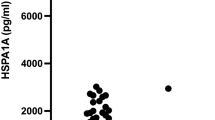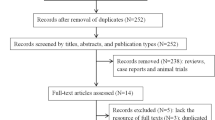Abstract
The 70 kDa heat shock protein (Hsp70) is a highly conservative molecular chaperone, that has important role in cell integrity. Recently considerable amount of data are accumulating on the potential role of Hsp70 in carcinogenesis and tumor progression. Most papers are focusing on intracellular or membrane bound protein, however very limited data exist on serum Hsp70, that can also induce innate and adaptive immune response. Previously we have published data on the correlation between coloretal cancer progression and serum Hsp70 concentration. The objective of this study was to compare the serum Hsp70 level in patients with small cell lung cancer (SCLC n = 70) and age matched healthy controlls (n = 121) and correlate Hsp70 level with other known serum biomarkers (LDH and NSE) of the disease. We found that the serum level of Hsp70 was significantly higher in SCLC patients compared to control subjects (mean value 6.91 vs 2.47 ng/ml, p = 0.001). The highest Hsp70 concentration was measured in stage IV advanced SCLC (Stage IV versus Stage I-III disease: 9.91 vs 4.38 ng/ml, p = 0.003). The serum Hsp70 level correlated with serum LDH (r = 0.426, p < 0,001) and NSE level (r = 0.455, p < 0,001). We found that high serum Hsp70 level predicted unfavorable survival, risk of death within 1 year was more than 3 times higher in patients with high baseline Hsp70 level (HR:3.509, CI: 1.066–11.562; p = 0.039). Our observations indicate that serum Hsp70 could be a valuable diagnostic and prognostic marker in small cell lung cancer.





Similar content being viewed by others
References
Srivastava PK, Menoret A, Basu S, Binder RJ, McQuade KL (1998) Heat shock proteins come of age: primitive functions acquire new roles in an adaptive world. Immunity 8(6):657–665
Rerole AL, Jego G, Garrido C (2011) Hsp70: anti-apoptotic and tumorigenic protein. Methods Mol Biol 787:205–230. doi:10.1007/978-1-61779-295-3_16
Nylandsted J, Rohde M, Brand K, Bastholm L, Elling F, Jaattela M (2000) Selective depletion of heat shock protein 70 (Hsp70) activates a tumor-specific death program that is independent of caspases and bypasses Bcl-2. Proc Natl Acad Sci U S A 97(14):7871–7876
Srivastava P (2002) Roles of heat-shock proteins in innate and adaptive immunity. Nature reviews. Immunology 2(3):185–194. doi:10.1038/nri749
Nicchitta CV (2003) Re-evaluating the role of heat-shock protein-peptide interactions in tumour immunity. Nature reviews. Immunology 3(5):427–432. doi:10.1038/nri1089
Mosser DD, Morimoto RI (2004) Molecular chaperones and the stress of oncogenesis. Oncogene 23(16):2907–2918. doi:10.1038/sj.onc.1207529
Whitesell L, Lindquist S (2009) Inhibiting the transcription factor HSF1 as an anticancer strategy. Expert Opin Ther Targets 13(4):469–478. doi:10.1517/14728220902832697
Powers MV, Workman P (2007) Inhibitors of the heat shock response: biology and pharmacology. FEBS Lett 581(19):3758–3769. doi:10.1016/j.febslet.2007.05.040
Calderwood SK, Khaleque MA, Sawyer DB, Ciocca DR (2006) Heat shock proteins in cancer: chaperones of tumorigenesis. Trends Biochem Sci 31(3):164–172. doi:10.1016/j.tibs.2006.01.006
Buzzard KA, Giaccia AJ, Killender M, Anderson RL (1998) Heat shock protein 72 modulates pathways of stress-induced apoptosis. J Biol Chem 273(27):17147–17153
Garrido CGS, Ravagnan L, Kroemer G (2001) Heat shock proteins: endogenous modulators of apoptotic cell death. Biochem Biophys Res Commun 286(3):433–442
Ciocca DR, Arrigo AP, Calderwood SK (2013) Heat shock proteins and heat shock factor 1 in carcinogenesis and tumor development: an update. Arch Toxicol 87(1):19–48. doi:10.1007/s00204-012-0918-z
Ciocca DR, Clark GM, Tandon AK, Fuqua SA, Welch WJ, McGuire WL (1993) Heat shock protein hsp70 in patients with axillary lymph node-negative breast cancer: prognostic implications. J Natl Cancer Inst 85(7):570–574
Thanner F, Sütterlin MW, Kapp M, Rieger L, Kristen P, Dietl J, Gassel AM, Müller T (2003) Heat-shock protein 70 as a prognostic marker in node-negative breast cancer. Anticancer Res 23(2 A):1057–1062
Liu FF, Miller N, Levin W, Zanke B, Cooper B, Henry M, Sherar MD, Pintilie M, Hunt JW, Hill RP (1996) The potential role of HSP70 as an indicator of response to radiation and hyperthermia treatments for recurrent breast cancer. Int J Hyperth 12(2):197–208 discussion 209–110
Vargas-Roig LM, Gago FE, Tello O, Aznar JC, Ciocca DR (1998) Heat shock protein expression and drug resistance in breast cancer patients treated with induction chemotherapy. Int J Cancer 79(5):468–475
Nanbu K, Konishi I, Mandai M, Kuroda H, Hamid AA, Komatsu T, Mori T (1998) Prognostic significance of heat shock proteins HSP70 and HSP90 in endometrial carcinomas. Cancer Detect Prev 22(6):549–555
Piura B, Rabinovich A, Yavelsky V, Wolfson M (2002) Heat shock proteins and malignancies of the female genital tract. Harefuah 141(11):969–972
Syrigos KN, Harrington KJ, Karayiannakis AJ, Sekara E, Chatziyianni E, Syrigou EI, Waxman J (2003) Clinical significance of heat shock protein-70 expression in bladder cancer. Urology 61(3):677–680
Kumar S, Stokes J, 3rd, Singh UP, Scissum Gunn K, Acharya A, Manne U, Mishra M (2016) Targeting Hsp70: a possible therapy for cancer. Cancer Lett 374(1):156–166. doi:10.1016/j.canlet.2016.01.056
Multhoff G, Pockley AG, Schmid TE, Schilling D (2015) The role of heat shock protein 70 (Hsp70) in radiation-induced immunomodulation. Cancer Lett 368(2):179–184. doi:10.1016/j.canlet.2015.02.013
Specht HM, Ahrens N, Blankenstein C, Duell T, Fietkau R, Gaipl US, Gunther C, Gunther S, Habl G, Hautmann H, Hautmann M, Huber RM, Molls M, Offner R, Rodel C, Rodel F, Schutz M, Combs SE, Multhoff G (2015) Heat shock Protein 70 (Hsp70) Peptide Activated Natural Killer (NK) Cells for the Treatment of Patients with Non-Small Cell Lung Cancer (NSCLC) after Radiochemotherapy (RCTx) - From Preclinical Studies to a Clinical Phase II Trial. Front Immunol 6:162. doi:10.3389/fimmu.2015.00162
Kocsis J, Madaras B, Toth EK, Fust G, Prohaszka Z (2010) Serum level of soluble 70-kD heat shock protein is associated with high mortality in patients with colorectal cancer without distant metastasis. Cell Stress Chaperones 15(2):143–151. doi:10.1007/s12192-009-0128-7
Yeh CH, Tseng R, Zhang Z, Cortes J, O'Brien S, Giles F, Hannah A, Estrov Z, Keating M, Kantarjian H, Albitar M (2009) Circulating heat shock protein 70 and progression in patients with chronic myeloid leukemia. Leuk Res 33(2):212–217. doi:10.1016/j.leukres.2008.07.012
Gehrmann M, Specht HM, Bayer C, Brandstetter M, Chizzali B, Duma M, Breuninger S, Hube K, Lehnerer S, van Phi V, Sage E, Schmid TE, Sedelmayr M, Schilling D, Sievert W, Stangl S, Multhoff G (2014) Hsp70--a biomarker for tumor detection and monitoring of outcome of radiation therapy in patients with squamous cell carcinoma of the head and neck. Radiat Oncol 9:131. doi:10.1186/1748-717X-9-131
Kocsis J, Meszaros T, Madaras B, Toth EK, Kamondi S, Gal P, Varga L, Prohaszka Z, Fust G (2011) High levels of acute phase proteins and soluble 70 kDa heat shock proteins are independent and additive risk factors for mortality in colorectal cancer. Cell Stress Chaperones 16(1):49–55. doi:10.1007/s12192-010-0220-z
Dutta SK, Girotra M, Singla M, Dutta A, Otis Stephen F, Nair PP, Merchant NB (2012) Serum HSP70: a novel biomarker for early detection of pancreatic cancer. Pancreas 41(4):530–534. doi:10.1097/MPA.0b013e3182374ace
Sato Y, Harada K, Sasaki M, Yasaka T, Nakanuma Y (2012) Heat shock proteins 27 and 70 are potential biliary markers for the detection of cholangiocarcinoma. Am J Pathol 180(1):123–130. doi:10.1016/j.ajpath.2011.09.010
Zimmermann M, Nickl S, Lambers C, Hacker S, Mitterbauer A, Hoetzenecker K, Rozsas A, Ostoros G, Laszlo V, Hofbauer H, Renyi-Vamos F, Klepetko W, Dome B, Ankersmit HJ (2012) Discrimination of clinical stages in non-small cell lung cancer patients by serum HSP27 and HSP70: a multi-institutional case-control study. Clinica Chimica Acta; Int J Clin Chem 413(13–14):1115–1120. doi:10.1016/j.cca.2012.03.008
Qiao Y, Liu B, Li Z (2008) Activation of NK cells by extracellular heat shock protein 70 through induction of NKG2D ligands on dendritic cells. Cancer Immun 8:12
Varano Della Vergiliana JF, Lansley SM, Porcel JM, Bielsa S, Brown JS, Creaney J, Temple SE, Waterer GW, Lee YC (2013) Bacterial infection elicits heat shock protein 72 release from pleural mesothelial cells. PLoS One 8(5):e63873. doi:10.1371/journal.pone.0063873
Brueckl WM, Herbst L, Lechler A, Fuchs F, Schoeberl A, Zirlik S, Klein P, Brunner TB, Papadopoulos T, Hohenberger W, Hahn EG, Wiest GH (2006) Predictive and prognostic factors in small cell lung carcinoma (SCLC)--analysis from routine clinical practice. Anticancer Res 26(6C):4825–4832
Byhardt RW, Hartz A, Libnoch JA, Hansen R, Cox JD (1986) Prognostic influence of TNM staging and LDH levels in small cell carcinoma of the lung (SCCL. Int J Radiat Oncol Biol Phys 12(5):771–777
Sagman U, Feld R, Evans WK, Warr D, Shepherd FA, Payne D, Pringle J, Yeoh J, DeBoer G, Malkin A (1991) The prognostic significance of pretreatment serum lactate dehydrogenase in patients with small-cell lung cancer. J Clin Oncol 9(6):954–961
Ganz PA, Ma PY, Wang HJ, Elashoff RM (1987) Evaluation of three biochemical markers for serially monitoring the therapy of small-cell lung cancer. J Clin Oncol 5(3):472–479
Bremnes RM, Sundstrom S, Aasebø U, Kaasa S, Hatlevoll R, Aamdal S, Group NLCS (2003) The value of prognostic factors in small cell lung cancer: results from a randomised multicenter study with minimum 5 year follow-up. Lung Cancer 39(3):303–313
Ando S, Suzuki M, Yamamoto N, Iida T, Kimura H (2004) The prognostic value of both neuron-specific enolase (NSE) and Cyfra21-1 in small cell lung cancer. Anticancer Res 24(3b):1941–1946
Molina R, Auge JM, Filella X, Vinolas N, Alicarte J, Domingo JM, Ballesta AM (2005) Pro-gastrin-releasing peptide (proGRP) in patients with benign and malignant diseases: comparison with CEA, SCC, CYFRA 21-1 and NSE in patients with lung cancer. Anticancer Res 25(3 A):1773–1778
Kocsis J, Mészáros T, Madaras B, Tóth EK, Kamondi S, Gál P, Varga L, Prohászka Z, Füst G (2011) High levels of acute phase proteins and soluble 70 kDa heat shock proteins are independent and additive risk factors for mortality in colorectal cancer. Cell Stress Chaperones 16(1):49–55. doi:10.1007/s12192-010-0220-z
Rozenberg P, Kocsis J, Saar M, Prohaszka Z, Fust G, Fishelson Z (2013) Elevated levels of mitochondrial mortalin and cytosolic HSP70 in blood as risk factors in patients with colorectal cancer. Int J Cancer J Int du Cancer 133(2):514–518. doi:10.1002/ijc.28029
Calderwood SK, Ciocca DR (2008) Heat shock proteins: stress proteins with Janus-like properties in cancer. Int J Hyperth 24(1):31–39. doi:10.1080/02656730701858305
Sherman M, Multhoff G (2007) Heat shock proteins in cancer. Ann N Y Acad Sci 1113:192–201. doi:10.1196/annals.1391.030
Radons J, Multhoff G (2005) Immunostimulatory functions of membrane-bound and exported heat shock protein 70. Exerc Immunol Rev 11:17–33
Multhoff G, Mizzen L, Winchester CC, Milner CM, Wenk S, Eissner G, Kampinga HH, Laumbacher B, Johnson J (1999) Heat shock protein 70 (Hsp70) stimulates proliferation and cytolytic activity of natural killer cells. Exp Hematol 27(11):1627–1636
Jagadish N, Parashar D, Gupta N, Agarwal S, Suri V, Kumar R, Suri V, Sadasukhi TC, Gupta A, Ansari AS, Lohiya NK, Suri A (2016) Heat shock protein 70–2 (HSP70–2) is a novel therapeutic target for colorectal cancer and is associated with tumor growth. BMC Cancer 16(1):561. doi:10.1186/s12885-016-2592-7
Wen W, Liu W, Shao Y, Chen L (2014) VER-155008, a small molecule inhibitor of HSP70 with potent anti-cancer activity on lung cancer cell lines. Exp Biol Med (Maywood) 239(5):638–645. doi:10.1177/1535370214527899
Author information
Authors and Affiliations
Corresponding author
Additional information
Drs Madaras and Horváth contributed equally to this article
This work was supported by the Debrecen Foundation for Cancer Patients
Rights and permissions
About this article
Cite this article
Balázs, M., Zsolt, H., László, G. et al. Serum Heat Shock Protein 70, as a Potential Biomarker for Small Cell Lung Cancer. Pathol. Oncol. Res. 23, 377–383 (2017). https://doi.org/10.1007/s12253-016-0118-x
Received:
Accepted:
Published:
Issue Date:
DOI: https://doi.org/10.1007/s12253-016-0118-x




